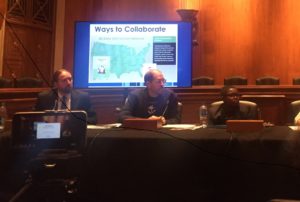 Afterschool programs can give students access to enriching career exploration opportunities outside of the school day, but many of these programs are not accessible to all middle schoolers. Last month, the Senate Career Technical Education (CTE) Caucus, in partnership with the Afterschool Alliance, organized a panel on making the most of middle school career exploration. This panel’s particular focus was the important role that afterschool programs can play in exposing students to career pathways.
Afterschool programs can give students access to enriching career exploration opportunities outside of the school day, but many of these programs are not accessible to all middle schoolers. Last month, the Senate Career Technical Education (CTE) Caucus, in partnership with the Afterschool Alliance, organized a panel on making the most of middle school career exploration. This panel’s particular focus was the important role that afterschool programs can play in exposing students to career pathways.
The panel included:
- Regina Sidney Brown, Director of the Delaware Afterschool Network
- Luke Rhine, Director of CTE and Science, Technology, Engineering and Mathematics (STEM) Initiatives for the Delaware Department of Education
- Daniela Grigioni, Executive Director of After-School All-Stars for Washington, D.C.
- Andrew Coy, Executive Director of the Digital Harbor Foundation in Baltimore
- Student panelist Jacob, participant in a Digital Harbor program
Afterschool programs encompass a wide range of activities that keep students engaged in their own learning outside of the regular school day. When students participate in an afterschool program in middle school, they are more likely to graduate high school. These programs offer opportunities for students to improve their skills in subjects ranging from computer science to agriculture. Learning these skills and interacting with professionals in a variety of fields allows students to explore and pursue different career paths of interest.
Expanding Access to High-quality Career Exploration After School
Despite all these programs have to offer, there are still major barriers to creating and expanding access to high-quality, career-focused afterschool programming in middle school. When panelists were asked about the largest barriers facing afterschool programming, their responses ranged from the difficulties of creating community partnerships to the lack of funding. Andrew Coy—whose organization, Digital Harbor, focuses on developing technology skills like computer programming, video game design and 3-D printing— summed up these issues as the need to have “formal support for informal learning.” This problem remains largely in communities of lower socioeconomic status, limiting access to enriching learning opportunities for students who could benefit the most.
The impacts that these programs have on middle schoolers make them worth the investment. Student panelist Jacob excitedly talked about the experiences he had with Digital Harbor—such as going to museums, participating in the White House science fair and learning to 3-D print—showing how important it is to give students a place to be creative. Jacob even earned certifications in Information Technology through the program. Having such a space outside of the classroom to encourage hands-on learning and career exploration allows students like Jacob to develop real world skills and get a leg up on both college and their careers.
Afterschool programs can also help close equity gaps by equipping learners with skills that may not be offered in the regular classroom but are highly valued in the job market. Exposing learners to new and different career pathways allows for diversity in these fields as more students can see themselves inhabiting those roles. Panelist Daniela Grigioni discussed how her organization, After-School All-Stars, engages middle schoolers, predominantly students of color, to help them build skills through programs in business and STEM. Early introduction to career exploration can help promote more equity within these fields.
By expanding career exploration in and out of the classroom, state leaders can foster creativity and passion among middle school students. This opens a pathway for students to imagine careers for themselves by giving them a sense of their options and what they do and do not want to do at an earlier age.
To read more about middle school CTE, check out Advance CTE’s report, Expanding Middle School CTE to Promote Lifelong Learning Success.
Jordan Dreisbach, Policy Intern
Tags: afterschool programs, Career Exploration, Equity, Middle school CTE

